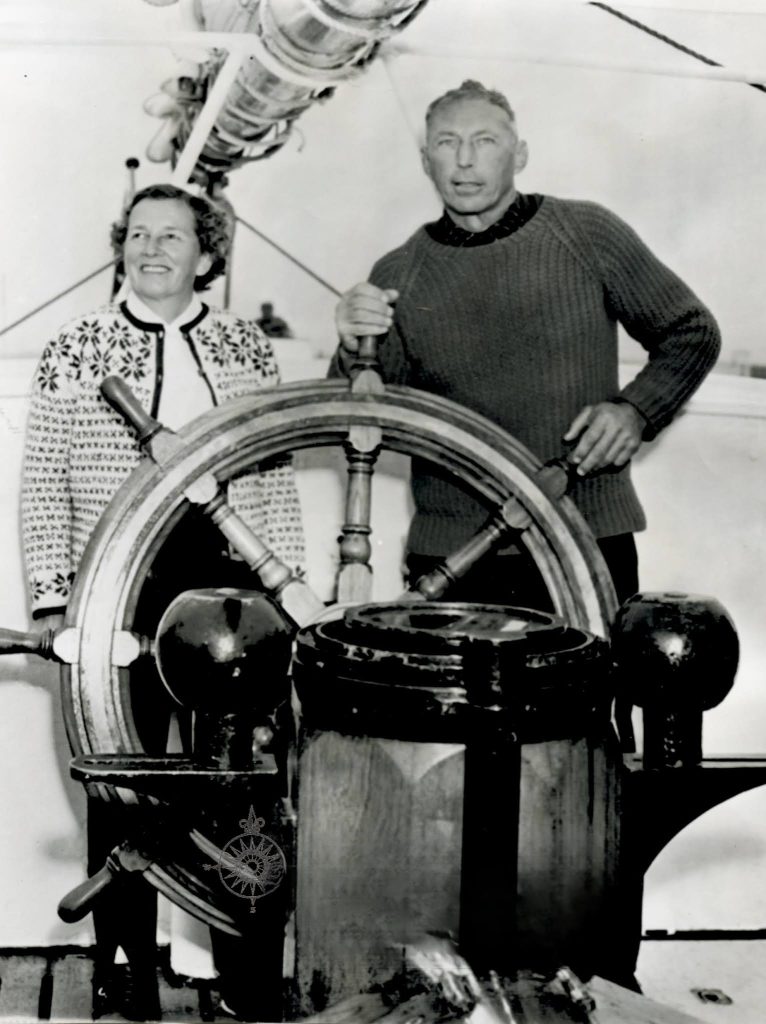A Lifetime on the Open Sea
In a world driven by modern technology and fast-paced communication, the story of Electa and Irving Johnson reminds us that true adventure once relied on little more than skill, courage, and the stars above. This remarkable American couple didn’t just take one daring voyage across the ocean they sailed around the world seven times.
Their incredible journeys were not about comfort or luxury. They were about challenge, growth, and education. Without relying on modern navigation tools or high-tech equipment, the Johnsons followed the constellations, ocean currents, and their instincts. And in doing so, they left behind a legacy that continues to inspire sailors and explorers across the globe.

Who Were Electa and Irving Johnson?
Irving Johnson was born in 1905 in Massachusetts. A passionate and fearless seaman from a young age, he dreamed of a life on the ocean. Electa “Exy” Search Johnson, his equally adventurous wife, came from an academic background but shared her husband’s love for travel and exploration.

After meeting in the early 1930s, they combined their talents and curiosity to chart a life unlike any other. They purchased a sailing vessel and set out to circumnavigate the globe not once, but repeatedly over the course of nearly four decades.
What made them stand out was not just their endurance or navigational prowess. It was their decision to turn their journeys into floating classrooms.
Training the Next Generation of Sailors
Every time the Johnsons set sail, they took with them a crew of young men, usually between the ages of 18 and 25. These weren’t experienced sailors. In fact, many had never set foot on a boat before. That was exactly the point.
Video:
Sailing On: The Legacy of Irving & Exy Johnson
Irving and Electa believed in experiential learning. Through weeks and months at sea, their crew members learned how to sail, read the stars, work as a team, and face adversity head-on. The Johnsons used every voyage as an opportunity to train the next generation of mariners not just in skills, but in character.
Many of the young people who sailed with the Johnsons later credited those voyages with changing the course of their lives. They gained confidence, discipline, and a deep respect for the sea.
Sailing Without Technology
What makes their voyages even more impressive by today’s standards is that they completed them without any modern navigational aids. There were no GPS satellites, no autopilots, no radar. Instead, the Johnsons used sextants, compasses, and dead reckoning an age-old method of navigation based on speed, time, and direction.
They read the sky like a map and the ocean like a book. Storms, squalls, and unknown coasts were part of the challenge, not deterrents.

Their boats were not massive luxury yachts, but modest sailing schooners made of wood and sailcloth. Yet those vessels carried them to the corners of the earth through the Suez Canal, around Cape Horn, into Polynesian islands, and across the Indian Ocean.
Documenting the Journey
Along the way, Irving and Electa did more than just sail. They documented their adventures through photographs, journals, and eventually, film. Irving Johnson became an accomplished writer and cinematographer, capturing their experiences for the world to see.
Video:
Irving and Exy: Seven Times Around the World with Teenagers in Tow | Odd Salon DAREDEVIL 3/7
Their books and documentaries became a source of inspiration for thousands of readers and viewers. Through vivid storytelling and honest depictions of life at sea, the Johnsons offered a rare glimpse into a world most people would never know firsthand.
A Legacy That Still Sails Today
Even though both Electa and Irving Johnson have long since passed away, their influence continues to ripple across oceans and generations. The vessels they captained, particularly the “Yankee,” became legendary in the sailing world. Their books are still in print. Their films are still screened. And the sailors they mentored went on to become captains, educators, and leaders in maritime industries around the globe.
Their story proves that you do not need to be born into adventure to become an adventurer. With curiosity, determination, and a willingness to learn, anyone can take to the sea or whatever their personal journey may be.

Conclusion: A Life Lived Fully
Electa and Irving Johnson didn’t just travel they taught. They didn’t just explore they inspired. They lived a life many only dream of, not with the help of modern comforts but through grit, skill, and a deep love for the ocean.
Their legacy floats on in every young sailor who learns to navigate by the stars and in every dreamer who dares to set course into the unknown. In a fast-moving digital age, their story remains a powerful reminder that some of the greatest journeys are made slowly, and with purpose.


